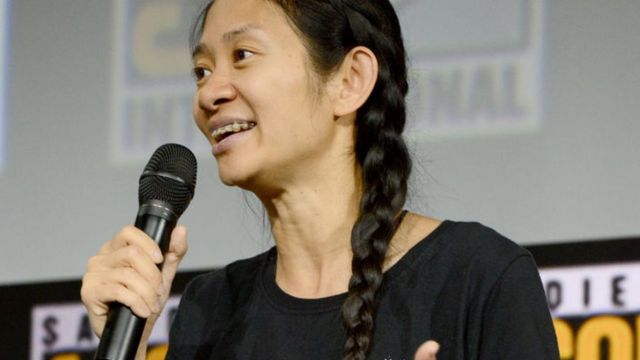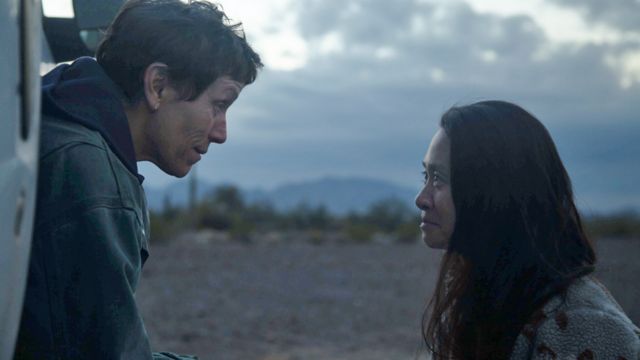April 29, 2021, (BBC News World).- Chinese director Chloé Zhao triumphed at the Oscars this Sunday, April 25, with her film “Nomadland” and made headlines around the world. However, the achievements of the director, who brought classical Chinese poetry to the Hollywood screen, met with silence and censorship in her country of birth.
The main state-owned media outlets ignored the news or downplayed it, while posts about it on social media were censored and deleted, the Hong Kong daily South China Morning Post reported.
Zhao won the award for best director and best picture with his story about people who live and travel in motor homes in the United States. Her story, starring Frances McDormand – who won the statuette for best leading actress -, led her to become the first Asian woman and the second woman to win the Oscar for best director.
Her film has already led her to win the Golden Globe for best director, and then it was celebrated as the “pride of China” by prominent media in his country of origin and became one of the most talked-about topics on social networks.
But, as Zhao’s work began to gain notoriety, “nationalists in China tracked down past interviews and began circulating statements that she had made 8 years ago, saying that growing up in Beijing was’ like being in a place where there were lies all over the place“, explained Celia Hatton, the BBC’s Asia Pacific editor.
“The communist authorities seem to have taken note of this: as posts celebrating Zhao’s victory are being removed from social media, and the state-controlled media did not mention the awards.”

The local press “has been told to minimize the Oscars 2021, ” Rebecca Davis, director of the specialized magazine Variety in China, explained on Twitter this Sunday.
No Chinese media broadcast the ceremony, not even from Hong Kong for the first time in 50 years, and until this Monday neither the official Xinhua agency nor the People’s Daily, two of the main state media, had echoed Zhao’s triumph in their web pages in Chinese.
In English, however, the nationalist newspaper Global Times did break that silence on Twitter with several articles on its website.
The newspaper announced the award by highlighting her talent but detracting from the film’s interest for Chinese audiences and pointing to the “political correctness” of the Oscars and even urged Zhao to use her role as a mediator between the US and China amidst the current tensions.
“We hope she becomes more and more mature,” noted an editorial in the newspaper published only in English.
Censorship in networks
Various foreign media with journalists in China or the Hong Kong semi-dependent SCMP echoed the censorship on the country’s main social networks.
Some of the blogger posts on Weibo and Wechat, the two most used platforms on the Chinese mainland, were blocked. Search terms such as “Chloé Zhao wins the Oscar for Best Director” did not show results in the first one.
That led some to resort to ingenuity to circumvent those limits.

Guda Baihua, an influencer with 13 million followers on Weibo, posted the video of Zhao’s acceptance speech with the title “A Speech at an Academy Awards,” but it was removed just two hours later, the SCMP reported.
“Subsequently, it showed a screenshot with a Weibo message saying that the video ‘had not met the platform’s requirements,'” the newspaper added.
On WeChat, a Chinese application similar to the Western WhatsApp but with many more services, searches on the filmmaker showed very limited results this Monday, as well as on other social networks.
Much of the user comments that were deleted were out of frustration over the attacks on Zhao, The New York Times reported.
“At a time when we should be celebrating Chloé Zhao, who has spoken about the influence of Chinese culture in her life, there are still people who are eager to disassociate themselves from her and their Chinese identity,” wrote one user, according to a comment recovered by the American newspaper before it was deleted.
And it is that the filmmaker alluded to classical Chinese poetry when collecting her Oscar for best direction.
On the cusp of Hollywood, Zhao recalled a game she played with his father in China: memorizing poems and reciting them together.
“There is a poem that I especially remember, entitled ‘The Three Character Classic. The first sentence is …’ people at birth are inherently good, ‘” she said, reciting the text in Chinese.
Those words had a great impact on her as a child, she said, and they continue to guide her to this day.


